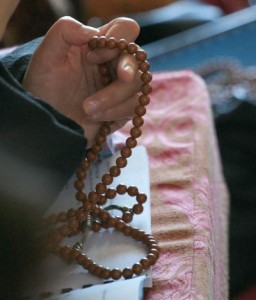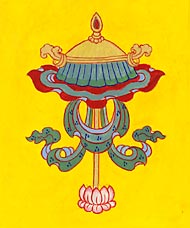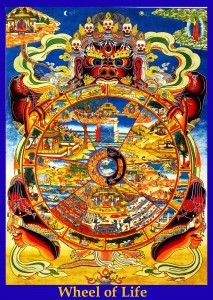An excerpt from a teaching called Dharma and the Western Mind by Jetsunma Ahkon Lhamo
I have found something wonderful about Westerners; we are really kind people. I don’t know what it is about us. Is it because we grew up and our parents told us? Is it because we heard it on the news and all the Presidents have told us and Kissinger says so and everybody knows that we are the strongest country in the world? This is what we grew up with. We think that if anybody is going to save the world that it is going to be us. Who else would it be, really? So we have this idea that we can save the world. Are we really thinking, “Well we really have something special, we are pretty extraordinary.” Or is it somehow that karmically a family has come together here and has the leisure to practice. It has the opportunity to accomplish Dharma. It even has the opportunity to make Dharma stable in a world in which it is no longer stable. It is no longer stable in Tibet. It is difficult in India. It is difficult in Nepal. Could it be that a family has come together in the right place at the right time that has the opportunity to do something really terrific and somehow we know that somewhere? Are we unusual? I know so many people that have grown up with the idea that they wanted to help people and to do something good for somebody some time. They felt almost a sense of being chosen, that there was some meaning that would be found in this life and a sense of purpose, so many of us have had that.
I don’t know if it is unique to Westerners. I have no idea. When I talk to Tibetans they talk all the time of being of use to sentient beings. So I know that that is a meaningful concept to them but I don’t know how they approach it or how they think of it. But I know that it is a thought that somehow a part of us has hopes of ourselves, that we will do something useful. We look at the world and we feel genuinely sorry. We have a big brother or a big sister attitude. We may not have an easy time looking at our suffering but we can see that other people are having a rough time. Sometimes we can’t even relate to the issues that make the times rough but we can try to help. Sometimes we mess it up worse than before, we really complicate things when we try to help and we have that knee jerk reaction without even understanding what the causes are. Nevertheless we feel that we can help.
I found therefore that in teaching Westerners this is a very important and central thing to understand, that the Buddha teaches us to be of use, to be of benefit to sentient beings. The Buddha teaches us that if you cannot be of use at least do no harm. But in Vajrayana Buddhism and Mahayana Buddhism you are actually asked to consider that other sentient beings are more important than you are by virtue of the fact that there are many of them and only one of you and that the name of the game is the end of suffering.
We are taught to love, I mean really love, which means defining love in new ways. We are taught that we are supposed to be on fire with it and know it is possible in order to practice Dharma correctly and purely. We have to think only of that which can be of benefit to beings and to bring about the end of suffering, only that is important. I have found that Westerners are moved by that, and they are stabilized in their path.
Those of you who are familiar with the center know that we have a twenty-four hour a day prayer vigil that has been running since 1985. There is never a time when there is not someone here, undertaking prayer for all sentient beings. I have been delighted and warmed to see how deeply my students respond to that job. They take it very seriously. They adopt the idea that if there is no-one else at least there is me, and pitiful as I am I am still going to give it my best shot to do something virtuous in order to be of use to sentient beings. I am going to try to help. That has been a great stabilizer on the path.
For those who have turned their minds in such a way that they care more for the welfare of sentient beings and are greatly motivated by the end of suffering, their hearts are warm with it and their minds are gentled with it. They will practice in order to benefit beings. You can’t stop them. Yet even for my long time students I find that those who haven’t quite got that, remain up and down about practice. It varies and they need inspiration, and they need someone to take them by the hand and help them to stay on the straight and narrow. Once we really learn to love in this profound and universal sense, there is no turning back. We are touched and we are changed.
©Jetsunma Ahkön Lhamo





